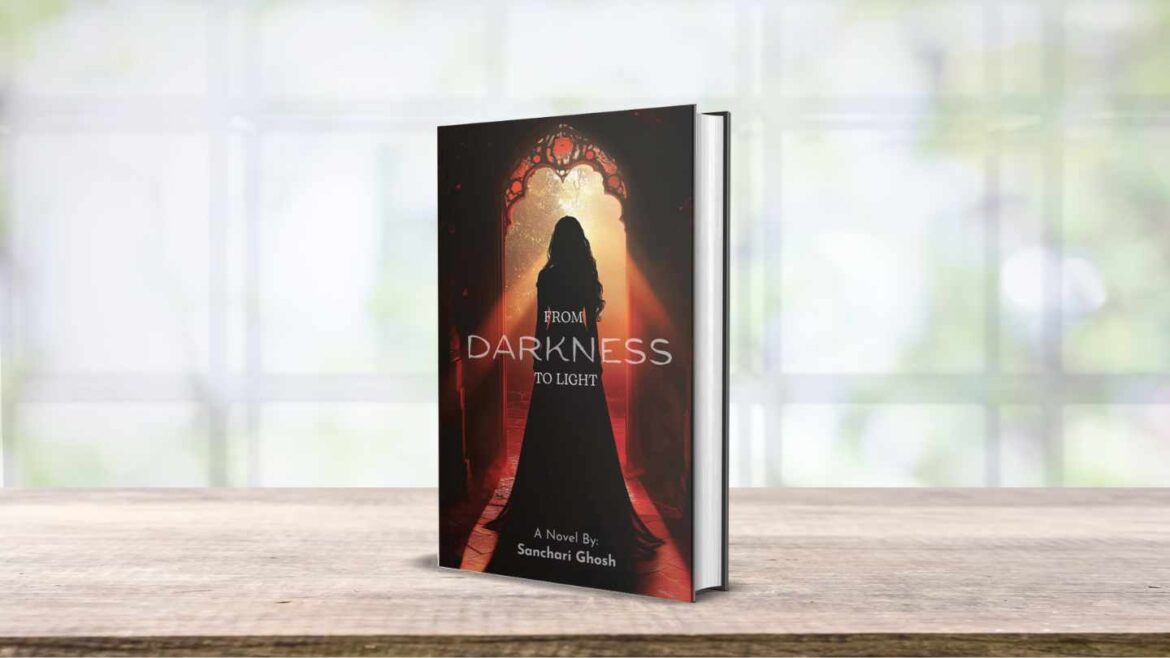Sanchari Ghosh’s “From Darkness to Light” is a novel that dares to tread where few have gone before, weaving a profound spiritual narrative into the gritty, often misunderstood world of a Mumbai brothel. It is a story that challenges preconceptions, seeking enlightenment and humanity in the most unexpected of places. The novel follows the journey of Naina, a simple, truth-seeking woman whose life circumstances lead her into prostitution. Yet, it is within these somber walls that she embarks on her most significant journey—one of self-realization, transforming the brothel into a crucible for philosophical inquiry and spiritual awakening.
Far from being a story solely about exploitation or victimhood, the narrative quickly pivots to Naina’s inner world. The catalyst for her transformation is the deep, soul-searching conversations she has with her customers, men who come seeking fleeting physical pleasure but find themselves engaged in discussions about karma, the nature of the soul, the illusion of Maya, and the teachings of the Bhagavad Gita. Through these dialogues, the brothel becomes an unlikely ashram where residents and visitors alike are forced to confront the truth of their existence. The plot is less a sequence of external events and more a progression of internal awakenings, as characters move from a state of ignorance (darkness) toward a deeper understanding of life’s purpose (light).
At the heart of the novel is Naina, who transcends the role of a victim to become a spiritual guide and a mirror reflecting the inner turmoil of her clients. Her journey is one of “losing herself to find herself,” using her environment as a platform for intense self-inquiry. She is not a distant, perfect sage; her wisdom is hard-won, shaped by her own past traumas, including a harrowing relationship with a manipulative man named Aalok. This personal history adds a layer of authenticity to her teachings, which are rooted in lived experience. When she speaks to clients about the nature of negative energy, karma, and false ego, it comes from a place of deep personal understanding. She gently guides men like Nikhil, a recurring customer, away from viewing their encounters as simple stress relief and toward an understanding of the karmic consequences of their actions.
She explains that they are “two people receiving negative energies from each other,” a simple yet profound reframing of their transaction. Similarly, she helps Lalit, an older man plagued by guilt over his past and insecurities about his daughter’s life, to see that his desires are rooted in a lack of self-knowledge and that true fulfillment comes from constructive action and service to others.
Naina is surrounded by a cast of women whose lives give the novel its emotional weight. Their stories of hardship, love, and betrayal ground the lofty philosophical themes in stark reality. We meet Sofia, who entered the profession to support her family after her husband lost his job, a decision that tears her away from her beloved daughter. There is Saloni, whose cynical exterior hides the deep wounds of a past betrayal by a boyfriend she financially supported. We see the aging Ishika, who clings desperately to her fading youth, and the tragic Jasmine, whose life savings—a small plot of land—are callously sold by her own son. These are not mere side characters; they are embodiments of the different facets of human suffering and resilience. Their conversations, often held late at night over shared drinks, are raw and unflinching, touching upon everything from the dangers of drug addiction to the heartbreak of unrequited love and the hypocrisy of a society that both uses and condemns them. Through them, Ghosh masterfully explores powerful themes, arguing that spirituality can be achieved anywhere. The concepts of Karma, Destiny, and Maya are constant refrains, offering a sense of order to the characters’ chaotic lives. The book also offers a sharp critique of societal hypocrisy, questioning conventional morality and the failures of the modern world.
“From Darkness to Light” is a courageous and thought-provoking novel. Its primary strength lies in its unique premise and the depth of its philosophical dialogue. Sanchari Ghosh handles her subject matter with immense compassion, giving voice and dignity to characters who are often silenced. The narrative is intensely dialogue-driven, which may be a challenge for readers seeking a fast-paced plot, but these conversations are the very essence of the book. They function as a modern-day Upanishad, exploring timeless questions in a contemporary, and profoundly challenging, setting.
The novel does not shy away from the grim realities of the women’s lives—the constant fear of police raids, the emotional toll of their work, and the vulnerability that comes with being on the fringes of society. Yet, it never wallows in despair. Instead, it consistently steers the narrative toward the possibility of inner freedom and enlightenment. The brothel, a symbol of physical and emotional confinement, paradoxically becomes the space where the soul can begin to understand its own unbound nature. It is a spiritual treatise set against a backdrop of human suffering and resilience, a powerful reminder that our external circumstances do not have to define our inner world. This story is both heartbreaking and deeply hopeful, and is highly recommended for readers who appreciate philosophical fiction that pushes boundaries and challenges the spirit.
Title: From Darkness to Light
Author: Sanchari Ghosh
Order Book: Amazon
Published By: Bluerose Publishers
